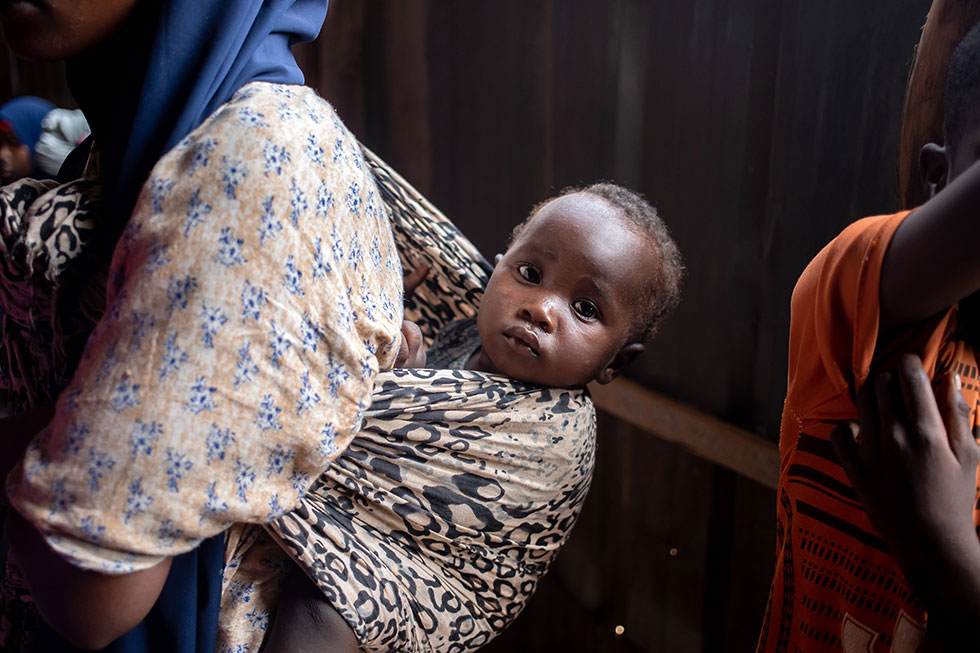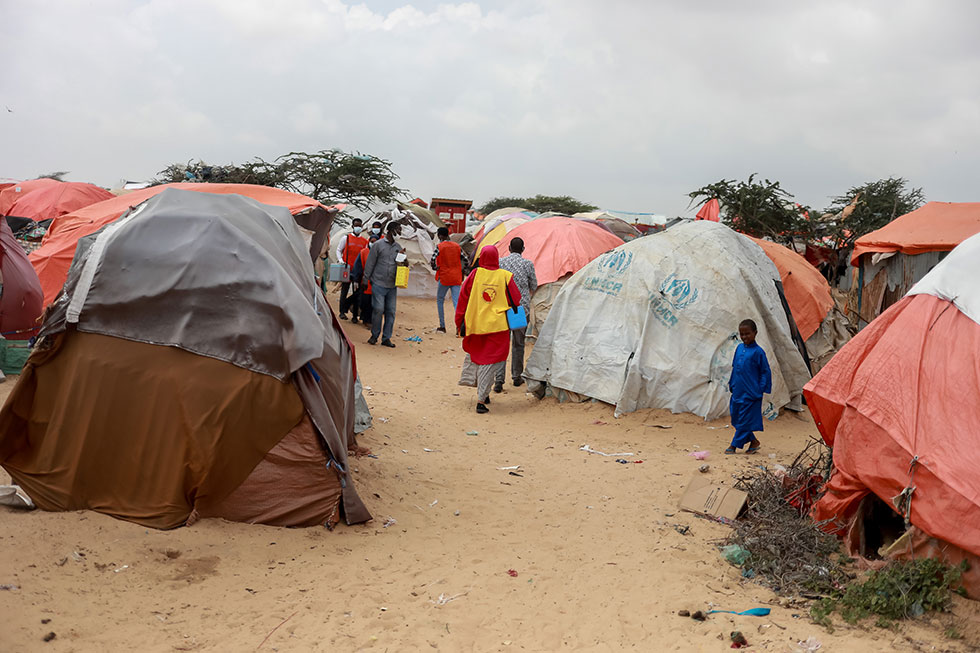 A child waits to receive vaccines during an integrated campaign, Mogadishu, 2022. Credit: WHO/Mukhtar Sudani/Ismail Taxte
A child waits to receive vaccines during an integrated campaign, Mogadishu, 2022. Credit: WHO/Mukhtar Sudani/Ismail Taxte
18 July 2023 – On a March day in the village of Burhakaba, Somalia, two-year-old Turki Abdinor Osman’s family didn’t find it unusual when he developed a fever and started to vomit. But soon afterwards, the toddler developed weakness in his left leg – an indicator of acute flaccid paralysis (AFP), the most common symptom of poliovirus infection. The family notified health workers in their village, who collected stool samples from the boy and, soon afterwards, confirmed the diagnosis: Turki had been infected by poliovirus. His family was stunned and struggled to reimagine their active toddler’s life with permanent paralysis.
This grim milestone has been faced by too many Somali families in an outbreak of circulating variant poliovirus that is now in its sixth year. A total of 31 children have been paralysed.
To ensure that no more families receive this kind of news about their children, tens of thousands of health workers, partners and policymakers are working with urgency to end the ongoing outbreak of variant poliovirus in Somalia.
Rollout of novel oral polio vaccine type 2
Following the global introduction of the novel oral polio vaccine type 2 (nOPV2) − which is genetically more stable than the both the trivalent oral polio vaccine (tOPV) and monovalent oral polio vaccine (mOPV2) – two years ago, with guidance from WHO and UNICEF, the Federal Government of Somalia completed the verification process for use of nOPV2 under the Emergency Use Listing.
On 27 May 2023, nOPV2 was used to vaccinate around 2.5m children under age five in parts of southern and central areas of Somalia as the second round of a subnational polio campaign. The first round of this campaign was conducted using tOPV in February 2023. On 22 June, over 740 000 under-fives were vaccinated in Somaliland.
WHO’s Eastern Mediterranean Region deployed nOPV2 to supplement other polio vaccines to protect children, particularly those living in areas with low immunization coverage, from all forms of polio. So far, seven of 11 high priority countries in the Region –Afghanistan, Djibouti, Egypt, Iran, Iraq, Pakistan and Somalia − have been verified to be ready for nOPV2 use in response to an outbreak of variant poliovirus type 2. Somalia is the Region’s third country to use nOPV2, following Egypt (2020) and Djibouti (2021).
Second phase of the Somalia Emergency Action Plan launched
The rollout of nOPV2 is one of several tactics Somalia is using to bring an end to the ongoing polio outbreak. In March 2022, the Federal Ministry of Health and partners developed and signed off the first phase of the Somalia Emergency Action Plan (SEAP). This strategic plan rolled out six rounds of campaigns, including an integrated one delivering both polio and measles vaccinations, to leverage resources and the opportunity to reach out to children.
Following an extensive review, a second phase of the SEAP that was launched a year later in Mogadishu built on health teams’ and partners’ momentum to end polio in Somalia. This phase incorporates valuable lessons learned from the initial phase. It zeroes in on enhancing the quality of polio immunization, intensifying poliovirus surveillance, focusing on mobile and vulnerable populations and strengthening partner coordination. The plan includes two nationwide immunization campaigns and three subnational rounds of in southern and central areas of Somalia. An additional set of five short interval additional dose (SIAD) vaccination opportunities will boost the immunity of children aged under 10 in newly accessible areas.
The recent creation of national and state-level polio coordination cells, led by national and state authorities, is also bringing together Somalia’s stakeholders’ strengths to reach every last child with polio vaccines.
Reaching previously unreached children
 A health worker visits a camp for internally displaced families to vaccinate children, Mogadishu, 2022. Credite: WHO/Mukhtar Sudani/Ismail Taxte
A health worker visits a camp for internally displaced families to vaccinate children, Mogadishu, 2022. Credite: WHO/Mukhtar Sudani/Ismail Taxte
Over the years, one of the consistent challenges health workers have faced in Somalia is to reach the unreached children with the life-saving polio vaccine against the backdrop of social and political instability, that has resulted in many areas being unreachable. However, recent security efforts and ongoing negotiations have resulted in better access to communities that were previously out of reach.
As a result, the number of inaccessible children has been reduced by over 80%, from 560 000 in 2019 to 89 000 by mid-2023.
Combined, all these efforts aim to vaccinate children like Turki, who have their entire lives ahead of them, to protect them from polio and other vaccine-preventable diseases.


